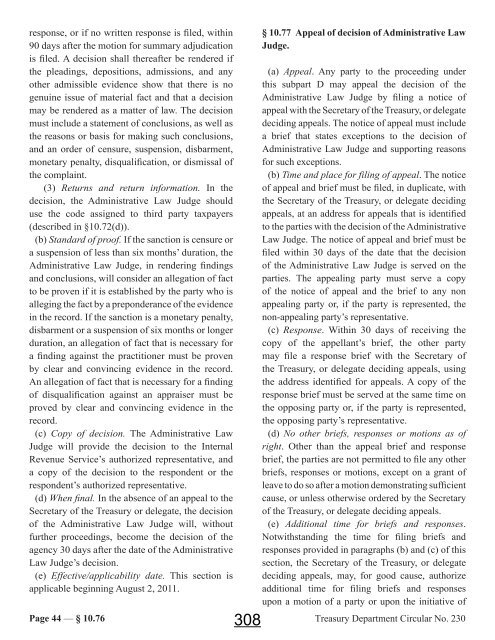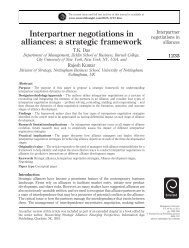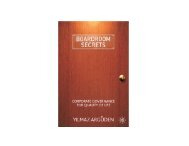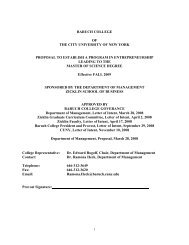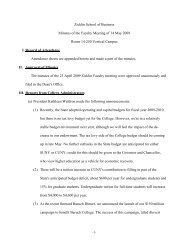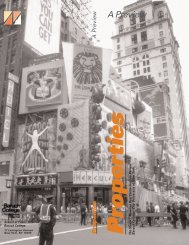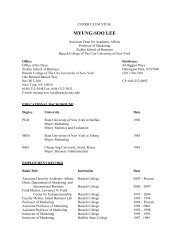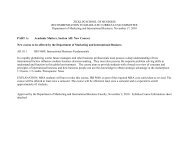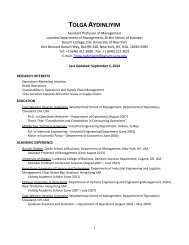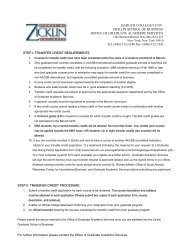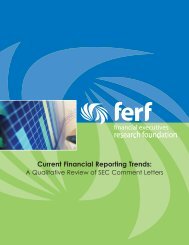Tax Seminar #3 – December 3 2012
Workbook - Zicklin School of Business
Workbook - Zicklin School of Business
Create successful ePaper yourself
Turn your PDF publications into a flip-book with our unique Google optimized e-Paper software.
esponse, or if no written response is filed, within<br />
90 days after the motion for summary adjudication<br />
is filed. A decision shall thereafter be rendered if<br />
the pleadings, depositions, admissions, and any<br />
other admissible evidence show that there is no<br />
genuine issue of material fact and that a decision<br />
may be rendered as a matter of law. The decision<br />
must include a statement of conclusions, as well as<br />
the reasons or basis for making such conclusions,<br />
and an order of censure, suspension, disbarment,<br />
monetary penalty, disqualification, or dismissal of<br />
the complaint.<br />
(3) Returns and return information. In the<br />
decision, the Administrative Law Judge should<br />
use the code assigned to third party taxpayers<br />
(described in §10.72(d)).<br />
(b) Standard of proof. If the sanction is censure or<br />
a suspension of less than six months’ duration, the<br />
Administrative Law Judge, in rendering findings<br />
and conclusions, will consider an allegation of fact<br />
to be proven if it is established by the party who is<br />
alleging the fact by a preponderance of the evidence<br />
in the record. If the sanction is a monetary penalty,<br />
disbarment or a suspension of six months or longer<br />
duration, an allegation of fact that is necessary for<br />
a finding against the practitioner must be proven<br />
by clear and convincing evidence in the record.<br />
An allegation of fact that is necessary for a finding<br />
of disqualification against an appraiser must be<br />
proved by clear and convincing evidence in the<br />
record.<br />
(c) Copy of decision. The Administrative Law<br />
Judge will provide the decision to the Internal<br />
Revenue Service’s authorized representative, and<br />
a copy of the decision to the respondent or the<br />
respondent’s authorized representative.<br />
(d) When final. In the absence of an appeal to the<br />
Secretary of the Treasury or delegate, the decision<br />
of the Administrative Law Judge will, without<br />
further proceedings, become the decision of the<br />
agency 30 days after the date of the Administrative<br />
Law Judge’s decision.<br />
(e) Effective/applicability date. This section is<br />
applicable beginning August 2, 2011.<br />
Page 44 — § 10.76<br />
308<br />
§ 10.77 Appeal of decision of Administrative Law<br />
Judge.<br />
(a) Appeal. Any party to the proceeding under<br />
this subpart D may appeal the decision of the<br />
Administrative Law Judge by filing a notice of<br />
appeal with the Secretary of the Treasury, or delegate<br />
deciding appeals. The notice of appeal must include<br />
a brief that states exceptions to the decision of<br />
Administrative Law Judge and supporting reasons<br />
for such exceptions.<br />
(b) Time and place for filing of appeal. The notice<br />
of appeal and brief must be filed, in duplicate, with<br />
the Secretary of the Treasury, or delegate deciding<br />
appeals, at an address for appeals that is identified<br />
to the parties with the decision of the Administrative<br />
Law Judge. The notice of appeal and brief must be<br />
filed within 30 days of the date that the decision<br />
of the Administrative Law Judge is served on the<br />
parties. The appealing party must serve a copy<br />
of the notice of appeal and the brief to any non<br />
appealing party or, if the party is represented, the<br />
non-appealing party’s representative.<br />
(c) Response. Within 30 days of receiving the<br />
copy of the appellant’s brief, the other party<br />
may file a response brief with the Secretary of<br />
the Treasury, or delegate deciding appeals, using<br />
the address identified for appeals. A copy of the<br />
response brief must be served at the same time on<br />
the opposing party or, if the party is represented,<br />
the opposing party’s representative.<br />
(d) No other briefs, responses or motions as of<br />
right. Other than the appeal brief and response<br />
brief, the parties are not permitted to file any other<br />
briefs, responses or motions, except on a grant of<br />
leave to do so after a motion demonstrating sufficient<br />
cause, or unless otherwise ordered by the Secretary<br />
of the Treasury, or delegate deciding appeals.<br />
(e) Additional time for briefs and responses.<br />
Notwithstanding the time for filing briefs and<br />
responses provided in paragraphs (b) and (c) of this<br />
section, the Secretary of the Treasury, or delegate<br />
deciding appeals, may, for good cause, authorize<br />
additional time for filing briefs and responses<br />
upon a motion of a party or upon the initiative of<br />
Treasury Department Circular No. 230


